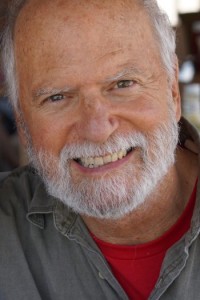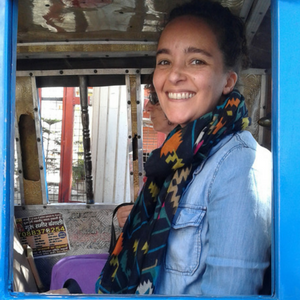“The greatest gift of art is that it can give people permission to think differently, to alter both consciousness and conscience,” says Robert Shetterly. “Well-made art authenticates its own message. We can’t have enough good art.”
Robert is a self-taught visual artist and a writer and cultural change agent. His painting of humane educator Zoe Weil appears alongside Stephanie Van Hook’s interview of Zoe in the Winter 2015 issue of the Metta Center’s magazine, Emergence (out in January). That painting is part of Robert’s portrait series Americans Who Tell the Truth, a project he launched with an image of Walt Whitman in 2002 and continues building upon.
Robert’s portraits can be viewed on his website, and his online shop offers them as posters and notecards. Each of the original works is painted in acrylic, on 30″ x 36″ wood panels, and they are available for exhibit.
 Americans Who Tell the Truth features a diverse array of portraits, from abolitionists to educators and from journalists to poets. How do you settle on which truth-tellers to paint?
Americans Who Tell the Truth features a diverse array of portraits, from abolitionists to educators and from journalists to poets. How do you settle on which truth-tellers to paint?
I’m looking for subjects from every aspect of our communal life who have found a way to make courageous objection to environmental, social, and economic injustice. I want the series to be eclectic so anyone coming to it can find something in common, a community to connect with. I choose people whose stories move me, who inspire me. The hardest part is leaving people out. I can’t paint all the people I’d like to.
You use the term “courageous citizenship.” How do you define that?
It’s one of the great ironies of our history that the ideals we all claim to embrace—equality, freedom, justice—have required so much persistence and courage to make real. And to make them real has required so much sacrifice. Making ideals real for everyone is the primary calling of citizenship. Because that process always challenges someone else’s profit, the status quo, and prejudice, it always requires courage.
What can we learn from courageous citizenship at this point in human history?
We learn that without it, democratic society is impossible. We learn that without it, solving our most serious problems is impossible. We learn that without it, all our systems are imbued with corporate values instead of the human values of fairness, justice, and morality.
In your 2012 artist’s statement, you say that you knew little of the “true history” of the United States. How do you describe that history, and how did you go about learning it?
The internal mission of Americans Who Tell the Truth was to learn that history. And each person, each story, led me deeper. I’ve read a lot. I’ve listened a lot. I’ve thought a lot. If our history can be described as “noble,” it’s only in relation to how closely we have adhered to our own ideals. The portrait project is an attempt to provide the stories of some of the people who have insisted on that nobility.
Our history is as much about denial and self-serving myth-making as it is about any kind of greatness. We are responsible for the world’s most extensive genocides—indigenous peoples and kidnapped Africans who died by the millions in the Middle Passage. We practiced slavery for over 200 years and then legalized racism—all the while calling ourselves the greatest democracy on earth. We have visited terrible exploitation and pollution on our environment. We have turned our government over to corporations and military contractors. And yet, so many courageous people have struggled and are struggling to set it all right.
In your learning experiences, did you stumble across any major a-ha’s—the kind that encouraged you to reflect on your personal life and contributions?
I stumbled on all kinds of things. One was that my art was the best and most my own when it wasn’t about me. When it was in service.
Another truth is in the words of Frederick Douglass: “Find out what any people will quietly submit to and you have found out the exact measure of injustice and wrong that will be imposed on them.” These words are true regardless of political system. Or, as Helen Keller said, “When you come to think of it there are no such things as divine, immutable or inalienable rights…” Both of them are telling us that everything depends on the strength of citizens to struggle for their rights and freedoms. If we stop struggling, we lose them. Very simple.
Another stumble was onto the contradiction between how many wonderful, committed people there are in this country [United States] and how poorly it is run and for whose benefit. In many ways it comes down to who controls the story. As long as the corporate media and the political establishment control the story, we are in serious trouble. Milan Kundera said, “The struggle of men against power is the struggle of memory against forgetting.” The Americans Who Tell the Truth project is one little piece of the effort to remember and to tell the stories which can save us.
Can you offer us some solutions for creating a healthy system? What might, for example, a regenerative democracy look like?
I partially answered that in the previous question, but the short answer is in local community. We are all so enmeshed in systems that have robbed us of our ability to lead environmentally and politically healthy lives, that we need to work outside the systems as best we can. The local and organic food movement is a great example of regenerative democracy. The effort to make local decisions about land and water use is another.
I think people should refuse to participate in a political process that is controlled by corporate money. Time and again we send what we think are good people into that money dominated system to see them turned into caricatures of themselves. There are two centers of power. One is in wealth and political control, the other and more powerful is in the people. We have to claim that power.
You’re currently writing a book based on Americans Who Tell the Truth. What first motivated you to write this book? And what keeps you going?
My working title is Talking Portraits: Lessons from Americans Who Tell the Truth. In the course of painting the portraits, I’ve met so many amazing people and traveled all over the US for exhibits and talks. While thinking about the meaning of our history—how it changes, why it doesn’t—I’ve had an incredible time and learned a lot. I wanted to record it because the project is so much more than the portraits themselves.
To learn more about Robert Shetterly and to inquire about the availability of his work for exhibition, please visit: www.americanswhotellthetruth.org.








